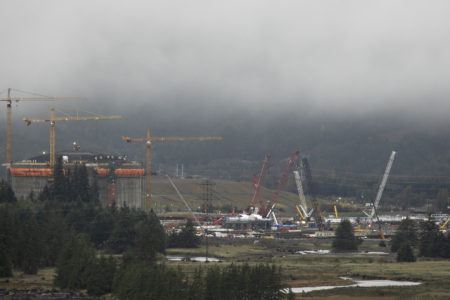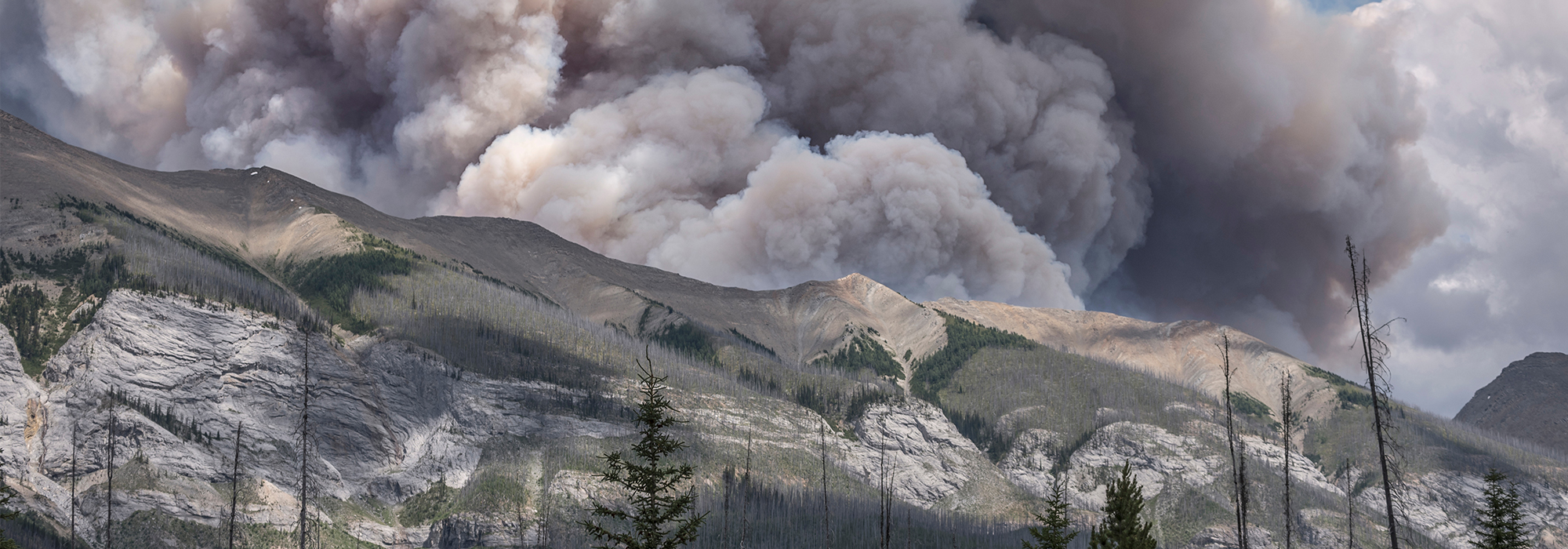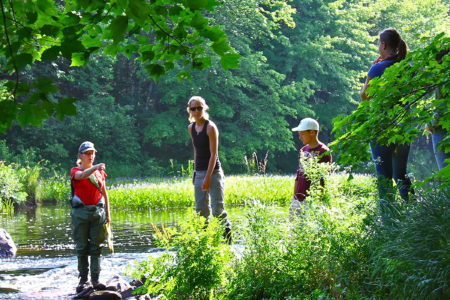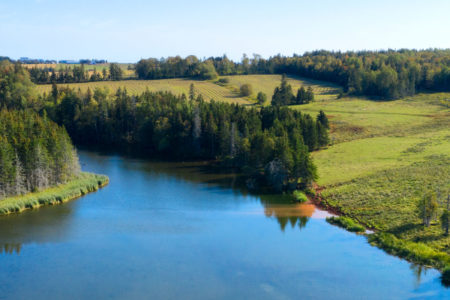
The year 2018 will be remembered as a wild roller-coaster of climate and water extremes in communities from coast to coast to coast. Floods, droughts and fires of historic proportions left devastation in their wake. British Columbia was hit particularly hard. At the peak of flooding in May, more than 2,800 people evacuated their homes in the Kootenay Boundary region. Twenty-three communities in the province were under water, and under a local state of emergency. Then hot, dry weather arrived with a vengeance: smoky skies choked vast swathes of the province in the summer, and level-four drought (the highest in the provincial system, indicating extremely dry conditions and a critical lack of water) persisted into late October in the Skeena-Nass region in the northwest of the province. This was an unprecedented situation with worrying implications for watersheds, salmon and the communities they sustain.
With minimal fanfare, 2018 also marked the 10-year anniversary of BC’s provincial water strategy: Living Water Smart. With it, the province established 45 policy and legislative commitments to prepare communities for a water-uncertain future and build a more sustainable freshwater regime. This plan was supposed to gird against exactly the kinds of extremes we now face almost every spring and summer.
Although it’s a decade old, Living Water Smart’s commitments and objectives are still highly relevant to today’s water challenges. A handful of specific or fringe actions – such as promoting “smart water choices” during the Vancouver 2010 Olympic Games – are now obsolete, but its overall vision for freshwater sustainability in BC is comprehensive and gets a lot right.
Against the backdrop of a province (and indeed a planet) mired in a rapidly emerging water crisis, and inspired by this 10-year milestone, our team of researchers and experts in water law and watershed governance at the University of Victoria (UVic) completed a comprehensive review of the BC government’s promises for sustaining fresh water from the past decade.
We were not surprised to see mixed results; that is often the nature of government promises.
There has been real progress worth celebrating alongside missed opportunities and major gaps in implementation. These are described in our detailed analysis report card, Taking the Pulse – BC Freshwater Policy Monitor, where we also outline actions that can achieve the vision and potential of water sustainability that Living Water Smart catalyzed.
BC has made strides forward since 2008, when its water strategy came into effect. Eight of its 45 specific commitments were achieved (almost 20 percent). Most notably, BC’s water law – which is more than 100 years old – has been modernized, reaching an important milestone in 2016 with the passing of the Water Sustainability Act. The act provides a host of new opportunities – and useful tools – to better protect waterways and involve communities in watershed planning and governance. But implementation is plodding along at a painfully slow pace, burdened by the challenge of integrating an expected 20,000 existing groundwater users into the water licensing regime. (Before the act came into force, BC did not regulate groundwater use at all.)
Timelines have certainly been stretched, but almost one-quarter (11 of 45) of Living Water Smart commitments can be considered to be in progress:
- Government staff and political leaders are pursuing meaningful new partnerships with Indigenous nations for fresh water.
- Some initial legal protections for water flows for nature now exist.
- Initiatives are underway to take stock of and improve water monitoring and reporting.
But more than one-third of important commitments have not been met with meaningful — or in some cases any — follow-through:
- We still do not have even a baseline understanding of the overall health of BC’s waters because the commitment to do regular state-of-water reporting has not been acted on.
- Drinking-water sources are no better protected province-wide than they were a decade ago.
- No requirement exists for large water users to measure and report how much water they use, a major gap in accounting.
- Water rental rates – the fees charged to anyone who has a licence to divert and use surface water or non-domestic groundwater – remain among the lowest in the country.
From a glass-half-full perspective, BC has a progressive water policy and progress is underway. From a glass-half-empty view, BC has indeed laid out the minimum needed to secure a sustainable water future, and yet a significant portion of these identified minimum requirements is not being met. The snail’s pace of implementation suggests water is not nearly high enough on the government or political agenda – especially given the consequences and costs of letting water issues become a crisis.
What are the most essential actions for BC to deliver on its commitment to build water resiliency and increase security?
Our team at UVic and a network of BC Water Leaders — experts, practitioners and champions from First Nations, salmon, wildlife and community organizations — tackled this question in December 2018 with a submission to the provincial government, outlining essential actions to ensure freshwater protection, including three priorities:
Advance reconciliation with Indigenous nations via renewed approaches to freshwater planning and decision-making. BC has committed to reconciliation (including implementing the United Nations Declaration on the Rights of Indigenous Peoples) across government, which involves fundamental shifts in how decisions are made with consent by and respect for Indigenous law and authority. Working in government-to-government forums with Indigenous nations on freshwater priorities is underway in a few key watersheds (like the Nicola First Nations), but these efforts must be expanded and sustained, with adequate resources to support Indigenous initiatives and leadership in freshwater governance and management.
Place water at the centre of a modern strategic land-use planning regime. Land-based activities like forestry and urban development have major impacts on fresh water. Yet, historically in BC, land-use planning efforts have paid little attention to water. Building a sustainable approach will require bridging this divide and ensuring water is not only considered throughout the planning process, but becomes central to ensuring a healthy and resilient landscape or basin-level approach. The Water Sustainability Act’s key sustainability provisions – water sustainability plans, water objectives and an environmental-flows regulation – are crucial tools to deploy as part of such a water-centric land-use planning approach.
Build a strategy for BC water and climate resiliency. Extreme droughts and floods are amplified by a changing climate and will certainly be part of BC’s future. A resilience approach, centred on water, will help shift British Columbia away from perpetual crisis management to instead be prepared to adapt and respond as the full impacts of a changing climate become more apparent. An immediate need is to update the provincial drought plan and ensure critical flow protections can be triggered and quickly deployed during acute water shortages.
The year 2018 illustrated the hydrological instability that will likely shape our collective future. Actions to protect fresh water matter more now than ever. Living Water Smart gives BC a strong foundation from which revitalize its water agenda, but government will need to amplify its efforts on implementation, prioritize water as part of the provincial agenda, and support communities to lead as we transition into an increasingly uncertain climate and water future.
Photo: Shutterstock by James Gabbert
Do you have something to say about the article you just read? Be part of the Policy Options discussion, and send in your own submission. Here is a link on how to do it. | Souhaitez-vous réagir à cet article ? Joignez-vous aux débats d’Options politiques et soumettez-nous votre texte en suivant ces directives.










